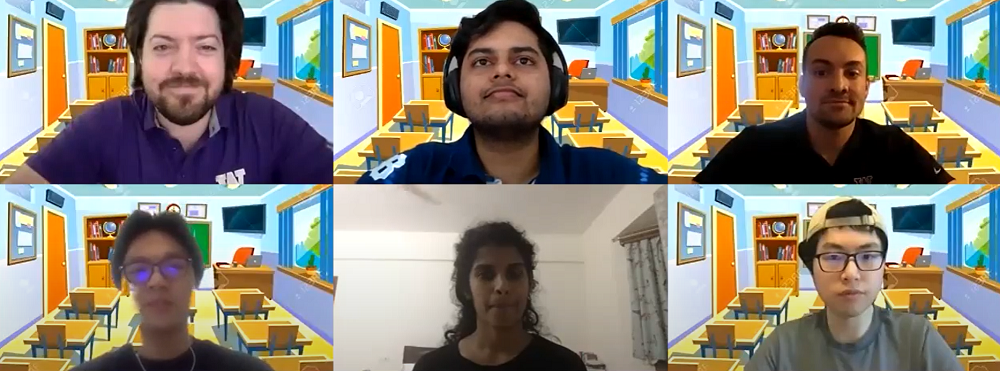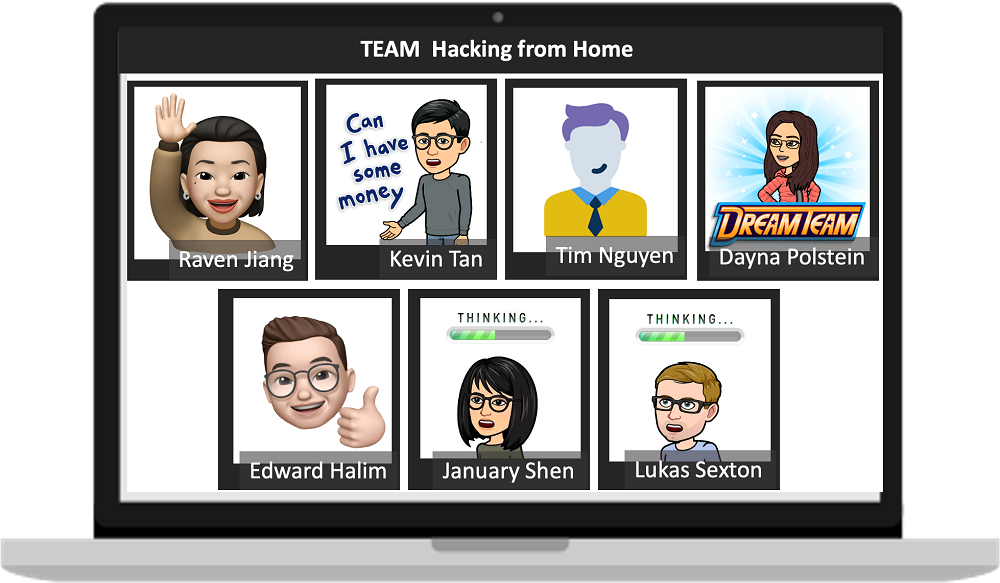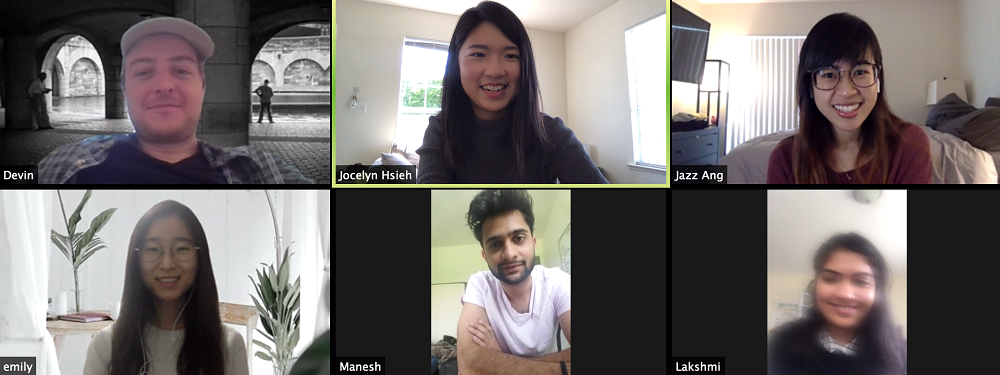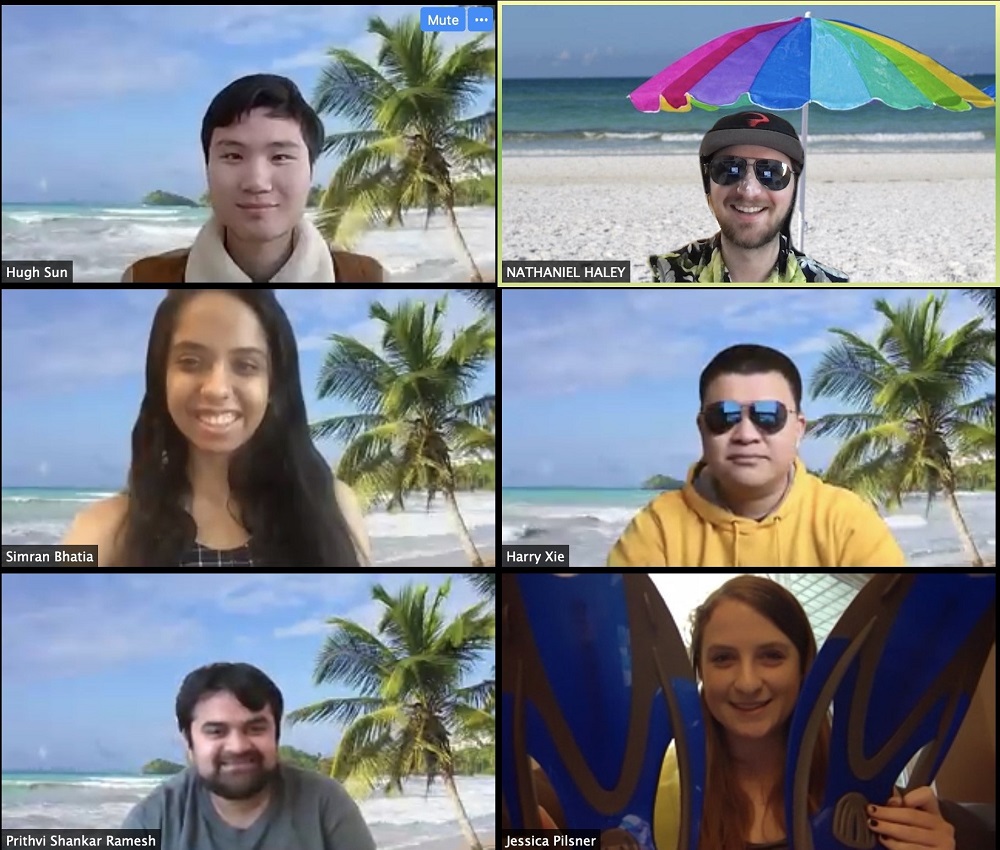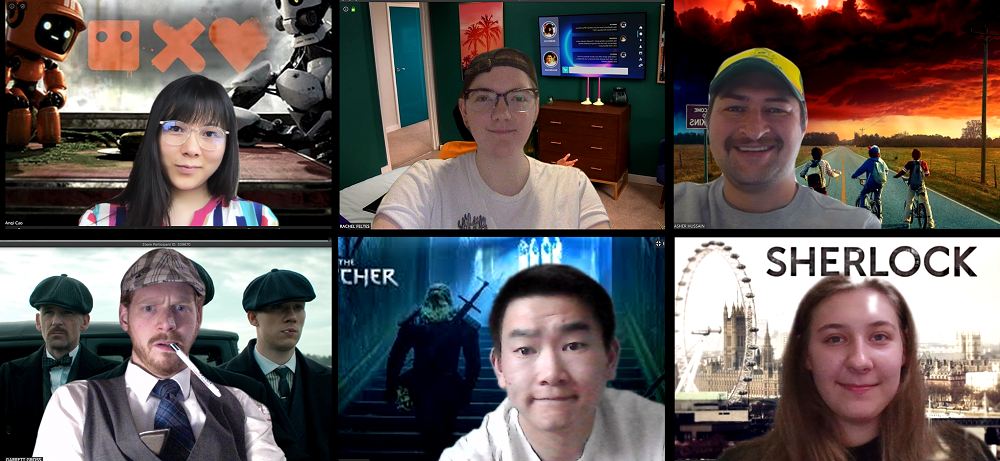Husky Hackathon sparks innovative solutions to challenges of the post-COVID world
Of the many awful symptoms of COVID-19, uncertainty may be the most pernicious. How will we live until effective therapies or vaccines are developed to control this devastating pandemic? What if social distancing becomes the new normal?
These questions became a motivating call-to-action for the 63 competitors in last week’s inaugural Husky AI Hackathon.
The week-long event was hosted by Foster Technology Club, an organization of MBA students at the Foster School of Business.
Nine teams composed of business, engineering, computer science and design students concocted a plethora of artificial intelligence-enhanced solutions to the mortal challenges that face schools, businesses, hospitals and, really, all humankind.
The 48-hour innovation cauldron produced apps to help teachers focus on human connections, to support spontaneous conversations in the virtual workplace, to predict critical resource shortages in hospital systems, to monitor restaurant capacity in real time, to optimize the routing of grocery shoppers, to connect supply and demand of the temp job market, and even to turn favorite meeting spaces into virtual hangouts.
Inspiration
The Husky AI Hackathon was the inspiration of Shobhit Gupta, a dynamic second-year MBA and self-described “futurist” who serves as president of the Foster Tech Club and EVP of the Entrepreneurship and Venture Capital Club, among several leadership roles in the MBA Program.
Drawing from his experience interning at Amazon Web Services and interacting through the Tech Club with entrepreneurs, VCs, enterprise leaders and academics in the area of AI, he became aware of an inexplicable shortcoming of the UW’s vaunted innovation engine. Despite the high quality of graduates from the Allen School of Computer Science and Engineering, the Information School and the Foster School of Business, the UW has produced relatively few software startups.
To begin remedying this situation, the Foster Tech Club’s executive committee drew up plans for a hackathon that would unite students from these disparate corners of campus, break silos and build AI software businesses from idea to execution. And rather than do this over a three-month course, they’d attempt to accomplish it in the space of 48 hours.
“The Hackathon is a simulation of real-life software product life cycle, requiring cross-functional collaboration, skill-based training, customer validation and business presentation,” Gupta says.
Application
Gupta and his leadership team received the enthusiastic backing of the Buerk Center for Entrepreneurship, lined up a powerhouse roster of corporate partners, recruited expert mentors and judges, and were steaming toward a spring competition on the Foster campus when COVID-19 hit.
Rather than allow sweeping quarantine orders to scrap plans, the framers decided to take the event online. And the competition’s challenge would pivot just as dramatically. The new mission? Develop a software solution for a world transformed by a global pandemic.
“The current public health crisis shines a light on a variety of diverse problems that we, as a society, have yet to solve,” Gupta says. “In healthcare, business, education and public policy, we are being challenged to adapt to new realities under immense pressure. As technology plays a central roll in guiding humanity through the crisis, we turned to students across the UW to re-engineer this new world using the power of cloud computing and artificial intelligence.”
Action
The weeklong event kicked off with a session by Denis Batalov, worldwide technical leader at Amazon Web Services, speaking on “AI for All.” A suite of workshops followed on pertinent topics such as design thinking and collaboration (with Assistant Dean Naomi Sanchez), building business plans (with Amit Mital of Kernel Labs), persuasive pitches (with of Kelly Bright formerly of Tableau), customer validation (with Peter Denton of Pioneer Square Labs).
Then it was time to get to work. For the two-day hackathon, 60 students (from 130 applicants) were randomly placed into nine teams, each a combination of MBAs, data scientists, computer engineers and designers. “The fun part of this is making people collaborate with people they don’t necessarily know,” Gupta says.
With the UW having gone online for the spring quarter, these virtual teams tended to be scattered far and wide geographically (Gupta, for instance, is at home in India, with hackathon events unfolding for him in the middle of the night).
Using modern remote meeting technologies, they worked around the clock with mentors from Seattle-based startups, AI organizations and tech companies to conceive and build business ideas and develop pitches and prototypes. Forty-eight hours later, the teams presented to a judging panel of leaders from tech companies, VC firms, incubators and healthcare organizations.
Their pitches were judged on their scale of impact, implementation of technology, business plan, human-centered design and presentation.
Solutions
The Husky AI Hackathon wasn’t all business. A creative team-naming contest, for example, produced such punny handles as “Dream Stream,” “Hacking from Home,” “Captive8,” “There’s More Phish in the C(++),” and the magnificently generic “AIGeneratedTeamName.”
AIGenerated got the Hackathon’s the last laugh, taking home the $4,000 Amazon Web Service Grand Prize for its “Teacher’s Bot” which automates routine elements of educating so that teachers can focus on building human connections with their students.
More Phish earned the $2,000 Buerk Center Second Prize for “Pantry,” an AI-powered app that enables the kind of spontaneous conversations in the virtual workplace that have traditionally bubbled up in the office.
And Captive8 won the $1,000 Buerk Center Third Prize for its teaching platform that creates a more engaging virtual classroom that sparks greater participation and improved grades.
Impact
Jessica Hatz, the incoming president of the Foster Tech Club, believes that the Husky AI Hackathon successfully bridged silos and encouraged diverse perspectives in a collaborative environment. “Teams not only built AI-powered prototypes like a classic hackathon,” she says, “but also simulated key elements of a typical startup’s go-to-market strategy—in one week.”
She adds that many of the teams are planning to pursue their ideas in the real world.
Beyond the immediate solutions created, the event also connected UW students to a galaxy of major players in the AI world. Hackathon partners included Amazon Web Service, Microsoft Startups, the Allen Institute for Artificial Intelligence, Madrona Venture Group, Create 33, Flying Fish Partners, Kernel Labs, F5 Networks and others.
“Foster Tech Club has provided a platform for enterprises, MBA students and startups to meet each other through a variety of events,” says Gupta, who will join AWS after graduating in June. “Husky AI Hackathon was an attempt to extend the platform to UW students and innovators around the topic of artificial intelligence. The Pacific Northwest is poised to become the AI capital of the world. And the impressive turnout of students and mentors who together built these unique products and business solutions for the post-COVID future shows how the UW is the top choice for recruiters seeking AI talent in engineering, design and management.”

